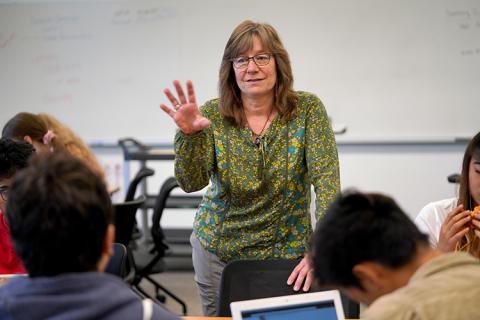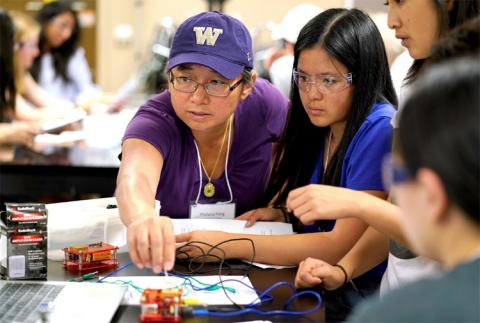Category: Engage and Enable Blog
-

Autoencoders help neural devices communicate with the brain
Aleenah Ansari CNT researchers at San Diego State University have found a way to efficiently compress neural data moving through a brain-computer interface by using autoencoders, a special type of artificial neural network. Jameson Thies is currently a graduate student in the Department of Electrical and Computer Engineering at the University of California, Davis, but his interest in neurotechnology…
-

A far-reaching impact: Teachers design curriculum to empower the next generation of engineers, researchers and scientists
Aleenah Ansari The Research Experience for Teachers program at the CNT instructs middle and high school teachers on how to introduce students to neural engineering in an inclusive, engaging and thoughtful way, while at the same time, it provides an immersive research experience for the teachers themselves. Chris Calvin, a science teacher at Mount Rainier…
-

Jeffrey Herron leverages his experience in academia and industry to improve research tools
Aleenah Ansari Jeffrey Herron began his affiliation with the center as a student in the lab of CNT member, Howard Chizeck. After graduation, he went to work at the center’s industry affiliate, Medtronic, developing research devices. Now, he has come full-circle, returning to the University of Washington in January 2019. Learn more about Herron’s academic…
-

Former CNT summer program participant, Hannah Werbel, receives Dean’s Medal
Aleenah Ansari Former CNT summer program participant, Hannah Werbel, and CNT undergraduate research assistant, Hannah Martens (not pictured), both received the UW College of Arts & Sciences Dean’s Medal this year. In this article, learn more about Werbel, her educational background and how her experience at the CNT sparked her interest in computer science. Hannah…
-

Ten hundred words, 90 seconds, and one opportunity to share the impact of your research
Aleenah Ansari On May 29, 2019, graduate students were challenged in a competition at the CNT to explain their research in 90 seconds using only the thousand most common words in the English language. Researchers are often asked to formulate questions, design experiments, and solve problems while considering limitations in data, funding, or other resources.…
-

At the crossroads of engineering and neuroscience: Amy Orsborn studies adaptive neural interfaces
In 2018, Amy Orsborn joined the University of Washington (UW) as a CNT-affiliated faculty member and Clare Boothe Luce Assistant Professor in the Department of Electrical & Computer Engineering and the Department of Bioengineering. She has worked on a range of research projects studying brain-computer interfaces (BCIs), but her interest in neurotechnology began in 2006 after attending a lecture by Eberhard Fetz, a CNT…
-

Neural co-processors for the brain
A new paper by CNT Co-Director, Rajesh Rao, proposes an innovative conceptual framework based on artificial neural networks for bi-directional brain-computer interfaces (BBCIs). This new way of thinking about BBCI development points a viable way toward moving neural devices out of the laboratory and into real-world settings. A brain-computer interface is a type of neurotechnology…
-

2019 Neural Computation and Engineering Connection encourages collaboration and conversation
This two-day event, held at the CNT and the University of Washington Husky Union Building, brought students and world-class neural engineering researchers together to listen to, engage with and learn from each other. In its eighth run, the Neural Computation and Engineering Connection, a two-day event from Jan. 24 to Jan. 25, did exactly what…
-

The center prepares for a new on-campus home
The CNT will be participating in the Bill & Melinda Gates Center Open House from 2:00–5:00 p.m. on Friday, March 1, 2019. Join us to see the center’s new headquarters, interact with CNT demonstrations and hear from CNT leadership. An RSVP is recommended, but not required (it’s fine to drop-in). The Center for Neurotechnology (CNT) is known…
-

When science teachers return for multiple years of the CNT’s Research Experience for Teachers program, everyone benefits
Wayne Gillam The Research Experience for Teachers (RET) program is supporting middle and high school teachers who return to the Center for Neurotechnology (CNT) year-after-year, benefiting not only those teachers’ students and peer educators, but the CNT’s education programs and researchers as well. Phelana Pang, a middle school science teacher at the Seattle Girls’ School, first…
